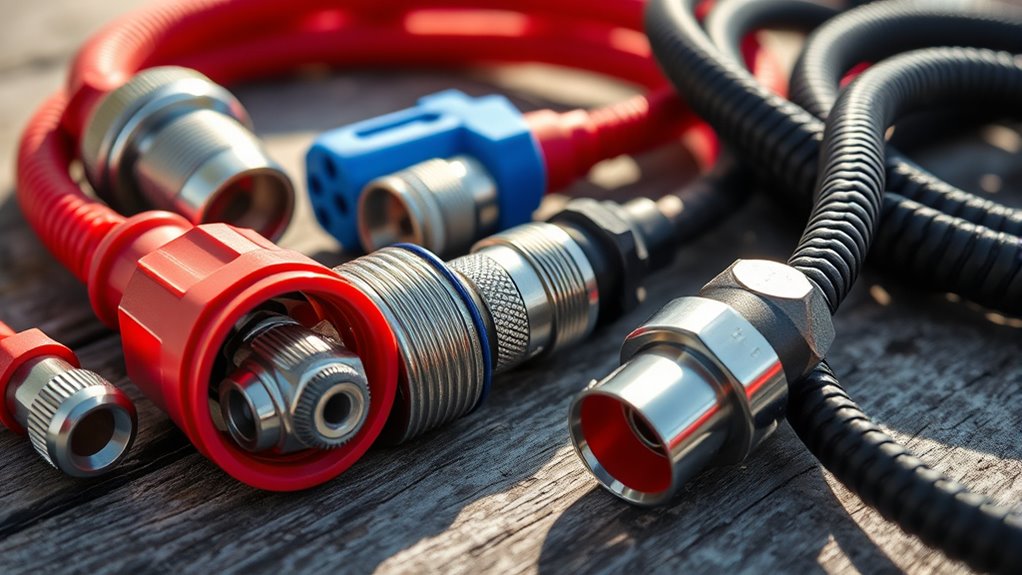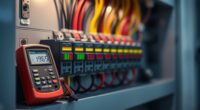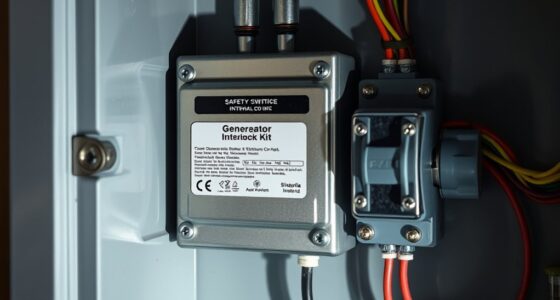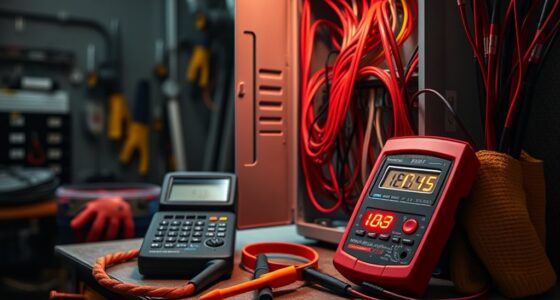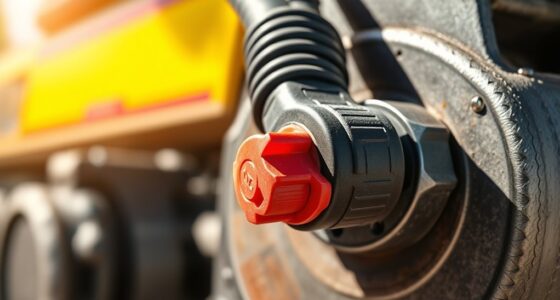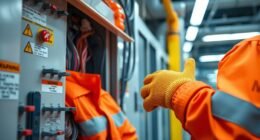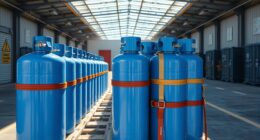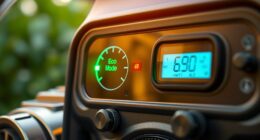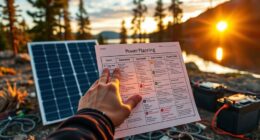When choosing adapters and dog-bone cords for your RV or marine generator, ensure they match your outlet types and amperage ratings to prevent overloads or damage. Opt for high-quality, insulated, weather-resistant cords suitable for your environment. Make sure connections are secure and grounded for safety. It’s vital to select adapters that handle your power needs safely. Keep in mind, understanding the specifics can help you make smart choices—continue to learn about the right equipment for your setup.
Key Takeaways
- Match adapter and cord amperage ratings to your generator’s outlet and your RV or marine equipment’s power needs.
- Choose adapters that fit the specific plug types and voltage requirements of your generator and connection site.
- Use high-quality, insulated, and weather-resistant cords and adapters for safety and durability in outdoor or marine environments.
- Ensure secure, grounded connections and inspect regularly for wear or damage to prevent electrical hazards.
- Consult manufacturer guidelines or a qualified electrician when selecting adapters to ensure safe, compatible power setup.

When powering your RV or marine generator, having the right adapters and cords is essential for safe and efficient operation. Ensuring proper power supply compatibility is key to preventing equipment damage and avoiding dangerous situations. Different generators and outlets often have varying plug types, voltages, and amperages, so choosing the correct adapters and cords helps bridge these differences seamlessly. You need to verify the specifications of your generator’s outlet and the power source you intend to connect to, whether it’s a standard shore power hookup, a different outlet type, or a different voltage. Using incompatible equipment can lead to electrical failures, overheating, or even fires, so safety considerations must always come first.
Adapters and dog-bone cords are designed to connect mismatched outlets to your generator or RV, but not all are created equal. It’s crucial to select adapters that match the specific plug types and amperage ratings of your equipment. For example, if your generator has a 30-amp outlet but you’re connecting to a 50-amp power source, you’ll need an adapter that safely handles the higher current without risking overload. Conversely, using an adapter with a lower amperage rating than your generator’s outlet can cause overheating or tripping. Always check the rated capacity of the cords and adapters and confirm they meet or exceed your power requirements.
Choosing the right adapters ensures safe power connections and prevents overloads or damage.
Safety considerations extend beyond just matching amperages and plug types. Proper insulation, quality construction, and secure connections are critical to prevent accidental disconnections or electrical shorts. When selecting cords and adapters, opt for those with grounded plugs and weather-resistant features, especially for marine applications where exposure to moisture is common. Keep cords off the ground and away from water to reduce the risk of electric shock or damage. Regularly inspect your cords and adapters for signs of wear, fraying, or damage, and replace them immediately if you notice any issues. Proper equipment selection is vital for maintaining a safe and reliable power setup.
Additionally, understanding the importance of surge protection and circuit breakers can’t be overstated. Using adapters and cords that incorporate built-in surge protection or connecting them through a protected power strip adds an extra layer of safety. Remember, the goal is to maintain a stable, safe power flow that supports your generator’s operation without risking harm to you or your equipment. When in doubt, consult your generator’s manufacturer guidelines or a qualified electrician to ensure you’re selecting the right adapters and cords, keeping safety and power supply compatibility at the forefront of your setup.
Frequently Asked Questions
Can Adapters Be Used With All Generator Brands?
Adapters can’t be used with all generator brands because generator compatibility varies. You need to check if the adapter’s connectors match your generator’s outlet. Also, consider adapter durability; a high-quality, sturdy adapter guarantees safe, reliable connections. Always verify compatibility before purchasing, as using incompatible adapters can lead to damage or safety hazards. Investing in durable, compatible adapters ensures you get the best performance and longevity for your RV or marine generator setup.
What Safety Features Should I Look for in Cords?
Ever wondered how to keep your setup safe? You should look for cords with excellent grounding safety features and high insulation quality. These features prevent electrical shocks and shorts, especially in wet or rugged environments. A heavy-duty, weather-resistant cord with proper grounding guarantees your safety and equipment longevity. Prioritize safety features that protect you and your gear, making every connection secure and reliable during your adventures.
Are There Specific Adapters for High-Power Generators?
Yes, there are specific adapters designed for high-power generators. You need to look for adapters with the right power capacity to handle your generator’s output safely. Always check compatibility issues, ensuring the adapter matches your generator’s plug type and voltage requirements. Using the correct adapter prevents overloads and potential damage, so prioritize those rated for high wattage and designed for your generator’s specifications.
How Long Can a Dog-Bone Cord Safely Be?
You can typically use a dog-bone cord up to 25 feet safely, but longer lengths can affect cord durability and pose safety risks. Longer cords increase resistance, which may cause overheating or voltage drops, especially with high-power generators. To guarantee safe operation, stick within recommended length limitations, and choose high-quality, durable cords designed for high-current use. Always inspect your cord regularly for signs of wear or damage before use.
Do Marine and RV Cords Meet the Same Standards?
Marine and RV cords don’t always meet the same standards, so you need to check for marine compatibility. Marine cords are designed to withstand harsh conditions like saltwater and moisture, adhering to stricter electrical standards. RV cords might not have this level of durability or marine-specific certifications. Always verify the cord’s specifications to confirm it complies with the appropriate electrical standards and is suitable for marine or RV use.
Conclusion
Choosing the right adapters and dog-bone cords is like finding the perfect puzzle piece — it fits seamlessly and keeps everything running smoothly. I once helped a fellow traveler who struggled with mismatched cords, and once he switched to the right ones, his generator powered up instantly, like flipping a switch. Don’t let the wrong connections drain your adventure. Pick quality, compatible cords, and enjoy the peace of mind knowing your RV or marine generator is always ready to go.
